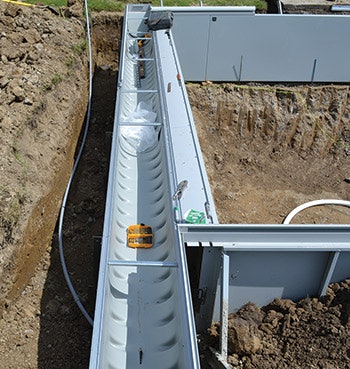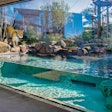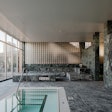{bglink 4626}Automatic pool covers were always destined to go mainstream. They offer a rare combination of dominant market drivers — safety, automation, convenience and conservation — all in one package.
So it's been no surprise they've enjoyed admirable growth. Even in the recession, automatic pool cover sales held up well. And now that pool builders are experiencing a sustained period of demand, automatic pool covers are reveling in that same salutary market.
APC arguments have always come easily because they're so consumer-centered. If you look at it from the customer's point of view, they just make sense. "Pool owners today do not want to work at maintaining their pool, they simply want to enjoy the pool," says Michael Shebek, president of Automatic Pool Covers, Westfield, Ind. "They're looking for convenience, and an automatic pool cover makes owning and maintaining a pool very easy.
"But beyond that, automatic pool covers actually reduce the overall costs of maintaining the pool because they help retain heat when the pool isn't in use, and additionally keep chemicals and water from evaporating, which together contributes to a reduction in the operational cost of running the pool over a three to five year period. And then there's the safety aspect, which is actually a really close second to the convenience."
RELATED: If You Aren't Selling Automatic Pool Covers, You're Missing Out
While it's true that APCs come with a hefty price tag, with this powerful argument behind them, APCs have steadily expanded downmarket from their original niche in high-end pool projects. Especially in their prime regions where the swim season can be significantly extended with an APC, they have entered the mainstream.
With this expansion of the APC towards the middle of the pool market, the question naturally arises how a builder should approach a business that may be somewhat unfamiliar. The product takes some installation and maintenance expertise: Better to outsource it to professionals? Or get good at it and take the all the profit yourself?
In considering the matter, Shebek says, "It really comes down to evaluating the competencies of your company, and deciding if it's more profitable for the staff to be installing automatic covers or if the staff would make more money doing something else — building more pools or installing other equipment."
"In either case," he adds, "all pool professionals should be offering automatic pool covers so they don't miss the opportunity to greatly increase their profits on every pool project."
Specialists
One company picking up the slack on APC installation and maintenance is CoverCare, with 14 locations in the heartland from Denver to Long Island, and from Milwaukee to Dallas.
CoverCare is a little unusual in that it specializes in the installation and maintenance of all brands of automatic pool covers. The company sells its own covers and also picks up business from pool companies looking to outsource the job.
Oddly enough, according to Jacob Bloss, director of operations, most referral and outsource business comes from builders who used to install covers themselves. "Sometimes they lose their installer, so they pick up the phone and call us," he says. "Other times, they are just so busy building, renovating or servicing pools that they are too busy to have their crew spend a day installing an automatic pool cover.
"Pool professionals tell me that once they start using our company for the installation and maintenance of their automatic pool cover sales, they find they can focus on their core business — whatever it is that they do best. In many cases this means building more pools, which is more profitable for the time involved. Because we are such a seasonal industry, we all know that the goal is to get as much done as possible in those short summer months."
For some builders, it's not so much the installation time involved, but the intricacies and details of maintenance, which can require post-installation visits when the building company is working on the next job.
"We handle all those little adjustments that need to be made after the initial installation of the cover," Bloss says. "It's common that automatic pool covers can get a tiny bit crooked right after the initial installation with a little bit of use, and we handle that extra visit out after installation to make everything perfect and the homeowner happy."
 Construction of an APC box on a Fox vinyl liner package pool from Hillside Pools, Fort Wayne, Ind. (Photo courtesy of Hillside Pools)
Construction of an APC box on a Fox vinyl liner package pool from Hillside Pools, Fort Wayne, Ind. (Photo courtesy of Hillside Pools)
Splitting Up the Work
As with any contract job, boundaries are important. APC installation is often divided into "pre-pour" and "post-pour" work ("pour" referring to the pouring of the concrete deck). Pre-pour mainly involves the installation of the APC box, retainer and brackets.
"Right now, about 75 percent of our customers do the pre-pour work themselves," Bloss says, "especially if the pool is a vinyl-liner pool — that work is fairly convenient to schedule during the installation of the pool liner. In these cases, CoverCare comes in and does all the post-pour work — installing the system itself, including the fabric and the motor."
RELATED: Covered Concerns: The Inescapable Logic of Automatic Pool Covers
"The other 25 percent of our customers have us do it all, both the pre-pour and post-pour work, to ensure that the installation goes smoothly. In fact, our company has developed a very specific technique to secure the vinyl to the roll-up tube that prevents a large crease down the center of the fabric, which is common for less-experienced installers. Not only is the crease an eyesore to the client who has just spent a lot of money on a cover and is expecting an aesthetically appealing cover, but the crease also leads to premature deterioration of the cover."
 Needle nose pliers complete some fine detail on this pre-pour installation by Hillside Pools. (Photo courtesy of Hillside Pools)
Needle nose pliers complete some fine detail on this pre-pour installation by Hillside Pools. (Photo courtesy of Hillside Pools)
Do It Yourself? Or Not
From the builder's perspective, the proper role in the APC deal depends on factors particular to the business. Some naturally embrace the APC work, others just sell them. One company that likes to do APCs in-house is Hillside Pools in Fort Wayne, Indiana.
"We have always done our own installations," says owner Terry Hill. "Because we are pool builders, it made sense for us to do both the pool construction with the automatic pool cover at the same time."
"We sell an automatic pool cover on 90 percent of the pools we build and renovate each year. It's expensive initially but we explain to the homeowner that they can actually save money in the long run. In Indiana, an automatic pool cover is the only barrier required so they don't need to build a fence around the perimeter of the pool."
On the other side of the fence is Steve Edwards of Edwards Construction, Wichita, Kans.
"We are high-end gunite pool builders, and we do everything from the digging to the rebar, plumbing and plaster," he says. "But it's hard to have your crew be an expert at everything and be able to maintain high-end quality in construction. Initially, we installed the automatic pool cover ourselves and did so for more than 6 years. However, once we tried outsourcing it, I was delighted to do that on our projects.
"When we were installing the covers ourselves, we had to actually build the box that held the auto cover. But it was very time-consuming to manage the building of the box, and it always led to multiple trips by my crew. It was hard to track the labor of that process through the installation. There was never a set cost to the preparation and installation of the automatic cover on the pool. And in our market, 85 percent of all the jobs we do have an automatic cover, so it's a pretty important part of almost every pool we build.
"With auto covers, you always have to go back and make one or two adjustments on the cover once it's installed. [Outsourcing the job] allows me and my crews to stay focused on the front end of the building, not having to mess with things after we are done with the pool."
5 Things Pool Dealers Should Tell New APC Owners1) They will now save approximately 10,000 gallons of water per year and $1,500 in gas heating or $1,000 in heat pump savings (if they have this equipment) Energy.gov/energysaver/swimming-pool-covers 2) Water on top of the cover should be removed with a cover pump prior to opening. Note that when the cover has nearly opened all the way the final gathered water needs removed before opening the final few feet. 3) There should be pool water supporting at least 50 percent of the cover. Less than 50 percent support risks damaging the cover and pool. Leaks happen, and a leak in the pool must be addressed immediately. 4) Despite the cover's ability to hold thousands of pounds, it should never be walked on. (Read to the homeowner the ASTM 1346 Safety Sticker located on the cover.) 5) Never close the cover until all swimmers are out of the pool and on the pool deck. Tips provided by Michael Shebek, president of Automatic Pool Covers |











































